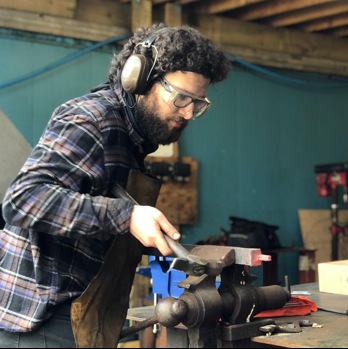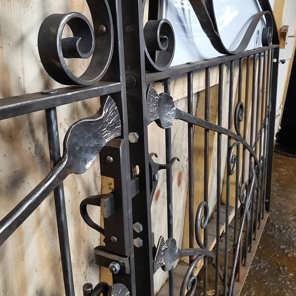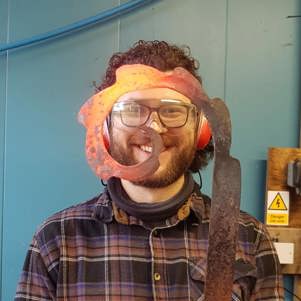
Credit: Iain Brown
A recent student is well on track to forging a new career after completing a course in blacksmithing at Myerscough College.

Credit: Iain Brown
26-year-old Luke Dudley has a degree in mechanical engineering, but was seeking a change of career path, so opted to become part of the first ever intake of the College’s Level 2 BTEC in Blacksmithing, a one-year practical programme, in 2019. After completing the course and achieving the highest grades, Luke has gone on to enjoy further success by becoming part of the Prince’s Foundation’s Building Craft Programme, a scheme designed to push people’s skills to the next level and continue on their journey to becoming the next generation of master craftspeople. The programme provides the opportunity to work towards a Level 3 NVQ in Heritage Skills.
Luke takes up his story: ‘’I studied Mechanical Engineering at university, because I was interested in both problem solving and creative design. However, the corporate world could not satisfy my curiosity for practical techniques - a deeper desire to make things with my own hands. So, in September 2019, I left my job and enrolled on the BTEC Level 2 in Blacksmithing course at Myerscough College. Unsurprisingly, I fell in love with the craft!
‘’There are only a handful of colleges that offer blacksmithing courses or have the facilities to allow students access to a well-equipped forge, with Myerscough being the only in the North West.

‘’The course is a great mix of practical forge time and classroom learning, covering all aspects of blacksmithing, from H&S to Metallurgy, from concept design all the way through to forging and construction. This provides a great foundation in blacksmithing allowing the student to build upon this with practical experience. I valued the chance to learn from Ruth Parkes, a highly skilled and knowledgeable blacksmith, with access to tools, an individual forge and anvil, and even a power hammer!
‘’The Building Craft Programme is a great way to put the skills you learnt at college to practice, learn about traditional crafts and heritage skills in the built environment, meet other craftspeople, and get paid while you learn!

‘’The first part of the course is an introductory programme where you can try your hand at other traditional crafts including stone masonry, timber framing and cob building. The next part of the course is the live-build project, where you work within an interdisciplinary team of traditional craft apprentices. This year’s project was to renovate a cottage on the Dumfries house estate, where my role was to design and forge a driveway and pedestrian gate for the property. The second half of the course involves month-long placements with several well-established blacksmiths around the UK, where you can gain invaluable real-world experience.
‘’I wish to further my studies with a government funded apprenticeship due to be launched in September. It is my dream to one day have a forge of my own to create and restore wonderful iron art, and hopefully help others pursue a career in the craft.’’

Everybody at Myerscough wishes Luke the very best in his future career.
Myerscough’s Level 2 Technical Diploma in Blacksmithing is the ideal qualification if you are intending to progress directly to employment in blacksmithing or may be useful if you are looking towards gaining a farriery apprenticeship.
This qualification has been developed in consultation with employers in the blacksmithing sector to ensure that you learn the skills and behaviours that will give you the best opportunity to be successful when applying for work.
Whereas a farrier deals with the making and fitting of all types of horseshoes, a blacksmith works more generally with metal, and creates objects, which can include horseshoes but also items such as gates, from wrought iron or steel by casting and forging. Blacksmiths practise a highly skilled trade that requires many hours of training in order to understand the properties of metals, to master the tools to hammer, bend and cut, and to develop the skills needed.
The photographs show some of Luke’s work as part of the Building Craft Programme.
by Dave Salmon